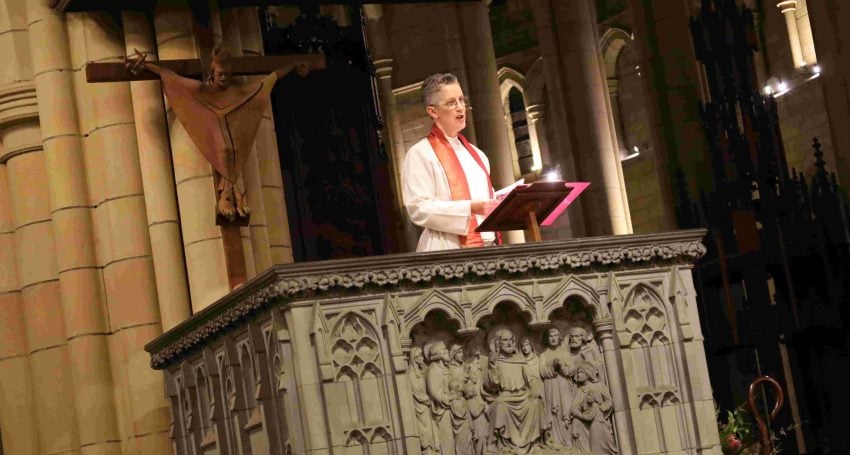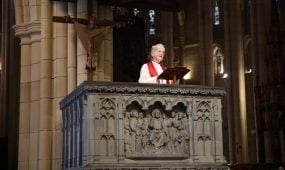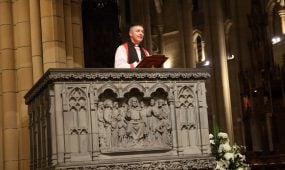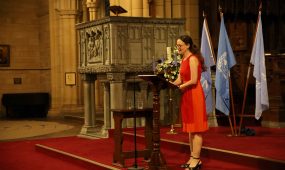Synod sermon 2023: Feast Day of John the Baptiser
Homilies & Addresses
“Surely, we, like John, can inhabit the challenges and tensions in our world with courage, looking outward, unconfined by the structure and the scaffolding. We can and should confound expectations: in justice, in generosity and in compassion. A new kind of future is ahead,” said The Ven. Lizzie Gaitskell in her Synod 2023 sermon

When is a wilderness not The Wilderness?
My youngest son got his first “proper” job six months ago. He works for a large national purveyor of rapidly delivered cuisine. We drove home after a shift recently and he told me that he was now rostered on the “drive-through”, and that was all fine and dandy except for the presence of the headset.
The headset is a pervasive piece of kit in the fast food industry and my son had been very keen to wear it, but when he put it on, he quickly discovered it wasn’t just tuned to the requests of two lanes of customers in the drive-through, but the kitchen, the other drive-through staff and various floor managers.
The sheer volume coming through the headset was overwhelming: orders and alterations to those orders, instructions from managers, complaints, general chit-chat and the noise of various alarms that signify orders being filled or the chips being ready.
He found himself thoroughly immersed in this fast-paced world and it was difficult to decipher one noise from another and to give each its right place; every sound had a valid claim on his time and attention and to ignore any was unthinkable. His mind was swimming when at long last he took the headset off, and unsurprisingly he arrived home with a headache.
When is a wilderness not The Wilderness?
My son’s “headset dilemma” reminds me that the volume of our modern, consumer-centred society is breathtaking, both the volume in decibels, and that in sheer weight of content. So much volume clamouring and competing for our attention: wealth, power, property, visibility, success, time – who has it, who wants it and who wants more of it?
We have chosen to immerse ourselves in a wilderness of our own making not far removed from the excesses, brutality and “bread and circuses” of the Roman Empire, the self-indulgence and weakness of Herod Antipas, and the fear and sectarianism of the Sadducees and Pharisees, all of whom John the Baptiser fearlessly called out. Surely John the Baptiser’s place – as the voice crying in the wilderness – is a beacon for contemporary Christians, as we cling to our faith in God’s saving work and love in Jesus and offer it up as a quietening and beautiful grace: balm for so much of the volume.
Advertisement
John appears in the first chapter of three of the four Gospels. Luke begins uniquely though, with the story of John’s birth. Luke conforms to a very familiar story-type within Jewish Scriptures: a set of (aged) parents cannot have children when at last, God promises the longed-for child. Luke’s listeners know this child is “one formed in the womb to be God’s servant” (Isaiah 49.5). John’s nativity, with its connections to the priestly world, echoes the nativity of Samuel. John, like Samuel, is being set up as a Nazirite, an ascetic vocation whose central duty is to be set apart “to God and for God.”
Given John’s lineage from two priestly families and that his arrival is announced in the Temple itself, Luke’s listeners – and John’s own family – might expect this child will conform to a priestly role; but pay attention because Luke 1 ends with the hint of other directions in John’s strength of spirit and uniqueness of character.
I think it’s more likely that John confounds expectations as he grows, engaging in ministry that offers a sharp contrast with the Temple. As one scholar suggests, “If one wanted to make a public proclamation of repentance one could go to the Temple… John presents the same opportunity”, free of charge at the Jordan. This decision to rattle the cages from outside and not within, is a risk that pays off to some extent: it is as a prophet, not as a priest, that his message is amplified. People go to him and experience the paradox of the wilderness not being The Wilderness. He offers them something quite different in baptism from other forms of ritual cleansing. “[John intuits] that a new kind of future is ahead, [and that] a different kind of human being is needed for that future.”
Advertisement
While Luke makes early connections between John and Samuel, it’s interesting that as an adult all three Synoptics make connections between John and Elijah, even down to his unusual dress. Both men are at home in the wilderness. Both are dangerously critical of the monarchs of their day. This of course is no accident either: many believed that Elijah would return to herald the coming Messiah.
Geography, too, is important as John’s life reiterates a third revered leader of the Jewish people. Some scholarship suggests that (depending on where John is baptising) the action of crossing the Jordan and returning from the wilderness, echoes the story of Joshua. The remembrance of this beloved leader, the protégé of Moses, who brought down the walls of a city might well have made Herod Antipas very nervous.
As the voice crying out in the wilderness, John inhabits the challenges and tensions within his life with courage and integrity. He could have been at the heart of the priestly class, working within the walls of the Temple; he chooses instead to work in a place with no walls at all. He could have chosen a rigorous closed community adherent to purity like that of the Essenes.
The Essenes lived in isolation, offering cleansing mikvah to those deemed pure by very narrow rules. John appears to offer baptism in the Jordan River (a symbol of homecoming if there ever was one!) to anyone who chooses “metanoia”: the transformation of minds in and through the grace of God. His call to repentance is marked by personal accountability shown in practical acts of justice, generosity and compassion (Luke 3). Above all, John stands on the shoulders of giants – Samuel, Elijah, Joshua and Moses – but makes it clear that he abrogates their status (John 1.19-26, echoed in Acts 13.25). Instead he points to the Messiah – who is Love Incarnate and whose mission is life-giving Grace.
I wonder what John would make of The Wilderness we are part of today. We live in a disposable society, an empire-building culture where drama, celebrity and inauthenticity make headlines. At the same time deep and devastating poverty, conflict and inequality enslave most of our world. We are destroying the true wildernesses of our planet, species by species – indifferent to the beauty of God’s creation. Success is seductive and greed is good and both make fabulous insulation. Consumerism has just about consumed us and yet, we hunger.
My boy can remove his headset at the end of his shift, but to cope, he has learned to discern what noises to tune into and out from, nonetheless the volume is still there and it wearies him. And so, it goes on. I wonder what John would make of the volume and distractions, the excess, and the mercilessness? I wonder what he would make of the wealth, power and property that the Church has accrued and what we have done with it?
Related Story
 Video
Video
ACSQ Synod 2023: highlights
Surely, we, like John, can inhabit the challenges and tensions in our world with courage, looking outward, unconfined by the structure and the scaffolding. We can and should confound expectations: in justice, in generosity and in compassion. A new kind of future is ahead. This Synod we will be discussing big issues of justice and inequality, property and insurance, viability and of our mission. As Anglicans, this is a time to ask ourselves: how are we true voices in the wilderness today – as a Diocese, as schools, parishes, Anglicare and other agencies?
We like John, must understand the wildernesses of our modern age and speak to them, and from them, with faith, hope and love. We must offer metanoia’s opportunities to anyone who asks, “What must I do to be saved?” and like John, we too must point to Jesus, God’s Love Incarnate and His life-giving Grace: living water in all our wilderness places.
Amen.
Editor’s note: For a full copy of Archdeacon Lizzie Gaitskell’s sermon that includes footnotes, please visit the ACSQ website.





